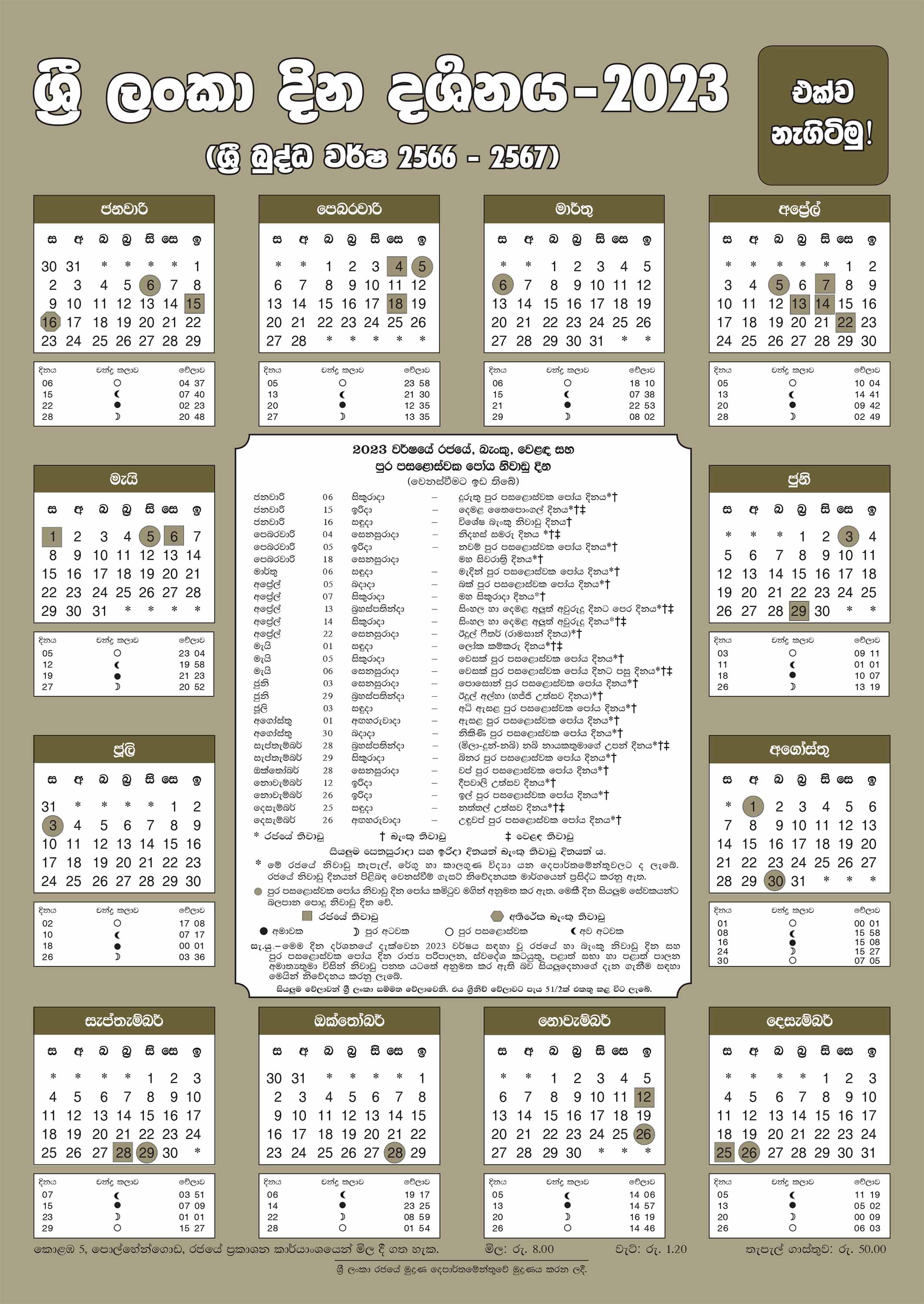Navigating Statutory Holidays In Sri Lanka: A Comprehensive Guide For 2025
Navigating Statutory Holidays in Sri Lanka: A Comprehensive Guide for 2025
Related Articles: Navigating Statutory Holidays in Sri Lanka: A Comprehensive Guide for 2025
Introduction
With great pleasure, we will explore the intriguing topic related to Navigating Statutory Holidays in Sri Lanka: A Comprehensive Guide for 2025. Let’s weave interesting information and offer fresh perspectives to the readers.
Table of Content
Navigating Statutory Holidays in Sri Lanka: A Comprehensive Guide for 2025

Sri Lanka, with its vibrant culture and rich history, observes a diverse array of statutory holidays throughout the year. These holidays, officially declared by the government, serve as opportunities for citizens to commemorate significant events, celebrate religious festivals, and enjoy time with loved ones. Understanding the calendar of these holidays is crucial for individuals and businesses alike, ensuring smooth operations and a harmonious observance of these important occasions.
Understanding the Dynamics of Sri Lankan Statutory Holidays:
Sri Lanka’s statutory holidays are a blend of national and religious celebrations, reflecting the country’s diverse cultural tapestry. These holidays are typically observed as non-working days for the majority of the workforce, allowing for a collective pause and reflection on the significance of the occasion. However, certain sectors, particularly essential services, may operate with modified schedules or maintain a skeletal workforce to ensure continuity.
The 2025 Calendar: A Detailed Look at Sri Lanka’s Statutory Holidays:
The following is a comprehensive list of statutory holidays in Sri Lanka for the year 2025, offering clarity on the dates and the events they commemorate:
January:
- January 1st: New Year’s Day – A global celebration marking the beginning of a new year, offering a chance to reflect on the past and embrace new aspirations.
- January 14th: Tamil Thai Pongal – A harvest festival celebrated by the Tamil community, marking the end of the harvest season and expressing gratitude for the bounty of the land.
February:
- February 4th: National Independence Day – Commemorates the day Sri Lanka gained independence from British rule in 1948, a pivotal moment in the nation’s history.
March:
- March 2nd: Maha Shivarathri – A significant Hindu festival dedicated to Lord Shiva, observed with fasting, prayers, and devotional ceremonies.
April:
- April 13th: Sinhala and Tamil New Year – A joyous occasion celebrated by both Sinhala and Tamil communities, marking the beginning of the new year according to the lunisolar calendar.
May:
- May 1st: May Day (International Workers’ Day) – A global celebration honoring workers and their contributions to society, recognizing the importance of labor rights and social justice.
June:
- June 14th: Poson Poya – A Buddhist holiday marking the arrival of Buddhism in Sri Lanka, commemorating the day when the teachings of the Buddha were first introduced to the island.
July:
- July 15th: Eid al-Adha (Bakrid) – A significant Islamic festival commemorating the willingness of Prophet Ibrahim to sacrifice his son, Ismail, as an act of obedience to God.
August:
- August 15th: Independence Day (India) – While not a statutory holiday in Sri Lanka, this day is often observed by the Indian community in the country, commemorating India’s independence from British rule.
September:
- September 10th: Binara Poya – A Buddhist holiday commemorating the day the Buddha visited Sri Lanka for the first time, bringing his teachings to the island.
October:
- October 26th: Deepavali (Diwali) – A Hindu festival of lights, symbolizing the triumph of good over evil and the victory of light over darkness.
November:
- November 11th: Vesak Poya – The most sacred Buddhist holiday in Sri Lanka, commemorating the birth, enlightenment, and passing away of the Buddha.
December:
- December 25th: Christmas Day – A Christian holiday celebrating the birth of Jesus Christ, observed with festive gatherings, gift-giving, and religious ceremonies.
December 26th: Boxing Day – A traditional holiday observed in many countries, often associated with gift-giving and charitable acts, marking the day after Christmas.
Beyond the Dates: Understanding the Cultural Significance:
These statutory holidays are more than just days off from work; they represent a deep cultural and historical significance for Sri Lanka. They provide opportunities for citizens to reconnect with their heritage, celebrate religious traditions, and foster a sense of unity and shared identity.
FAQs: Addressing Common Queries about Sri Lankan Statutory Holidays:
1. Are all statutory holidays non-working days?
While the majority of statutory holidays are observed as non-working days, certain sectors, such as essential services, may operate with modified schedules or maintain a skeletal workforce to ensure continuity.
2. Are statutory holidays applicable to all businesses?
Generally, statutory holidays are applicable to all businesses in Sri Lanka, although some exceptions may exist for specific industries or types of employment.
3. Can businesses choose to operate on statutory holidays?
Businesses can choose to operate on statutory holidays, but they are obligated to pay their employees at a premium rate for working on these days.
4. What happens if a statutory holiday falls on a weekend?
If a statutory holiday falls on a weekend, it is typically not observed as a non-working day, unless it is specifically declared as such by the government.
5. How can I stay updated on the latest information regarding statutory holidays?
The official website of the Sri Lankan government or reliable news sources provide the most accurate and up-to-date information on statutory holidays.
Tips for Effectively Navigating Statutory Holidays in Sri Lanka:
- Plan ahead: Review the statutory holiday calendar well in advance to ensure you are prepared for potential disruptions to business operations or travel plans.
- Communicate clearly: Inform employees, clients, and partners about any changes to business operations during statutory holidays.
- Respect cultural sensitivities: Be mindful of the cultural significance of each holiday and avoid any activities that may be disrespectful or insensitive.
- Utilize the time wisely: Use statutory holidays as an opportunity to relax, recharge, and engage in meaningful activities with family and friends.
Conclusion: The Significance of Statutory Holidays in Sri Lanka:
Statutory holidays in Sri Lanka serve as a vital reminder of the country’s rich cultural heritage and the importance of collective celebration. They provide opportunities for citizens to reconnect with their roots, observe religious traditions, and foster a sense of unity and shared identity. Understanding the calendar of these holidays is essential for individuals and businesses alike, ensuring smooth operations and a harmonious observance of these significant occasions. By embracing the spirit of these holidays, we can contribute to a vibrant and culturally rich Sri Lanka.





Closure
Thus, we hope this article has provided valuable insights into Navigating Statutory Holidays in Sri Lanka: A Comprehensive Guide for 2025. We thank you for taking the time to read this article. See you in our next article!
You may also like
Recent Posts
- Exploring The World In February 2025: A Guide To Travel Destinations
- Navigating The Summer School Holidays In The UK: A Comprehensive Guide For 2025
- Navigating Singapore’s Public Holidays In 2025: A Comprehensive Guide
- A Comprehensive Guide To Skiing Holidays In January 2025
- Embracing The Winter Wonderland: A Comprehensive Guide To Ski Holidays In January 2025
- Tenerife In April 2025: A Springtime Escape To The Canary Islands
- The Future Of Travel: A Look At Holiday Trends For 2025
- Unveiling The World Of Travel: An Exploration Of Thomas Cook’s 2025 Brochure
Leave a Reply